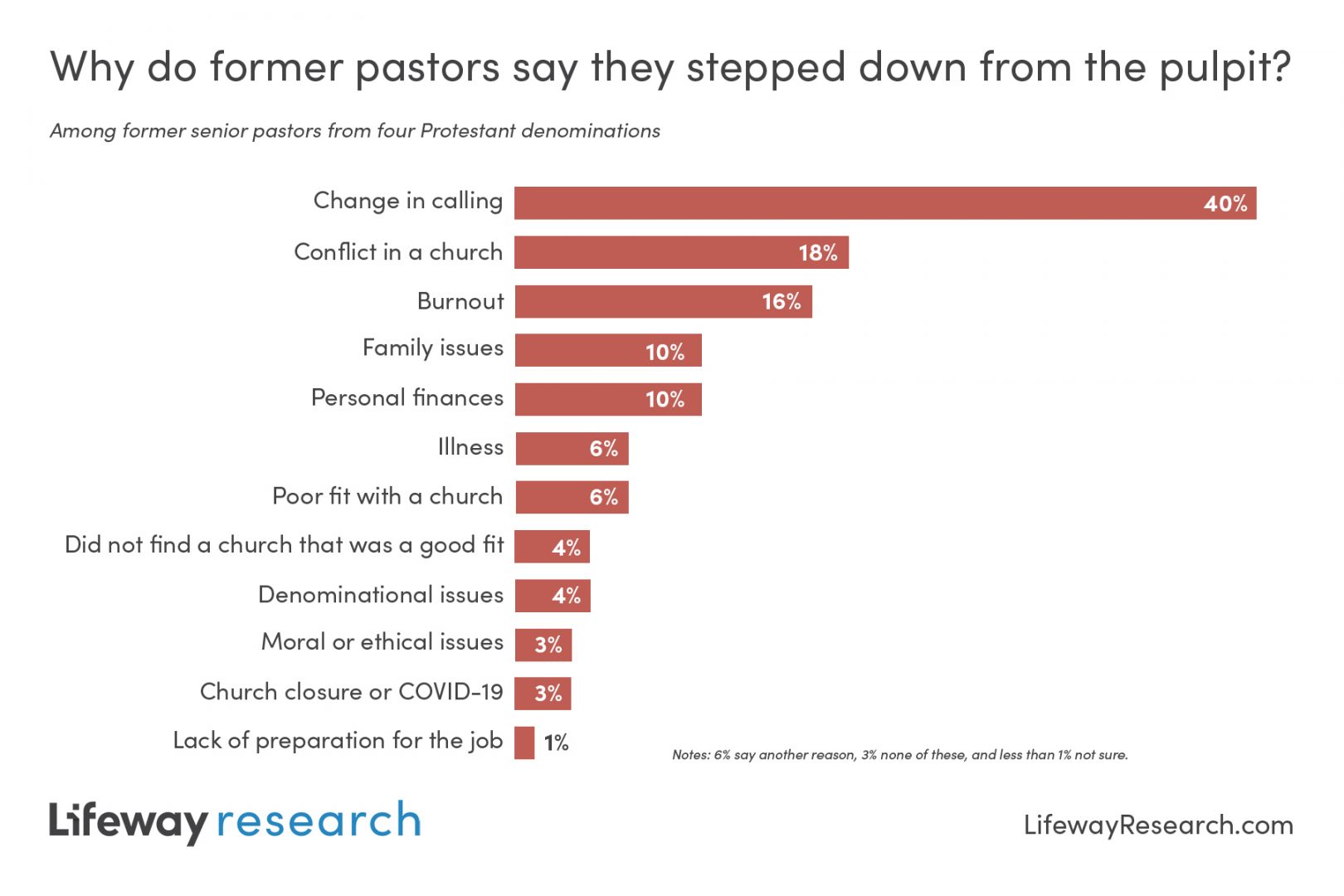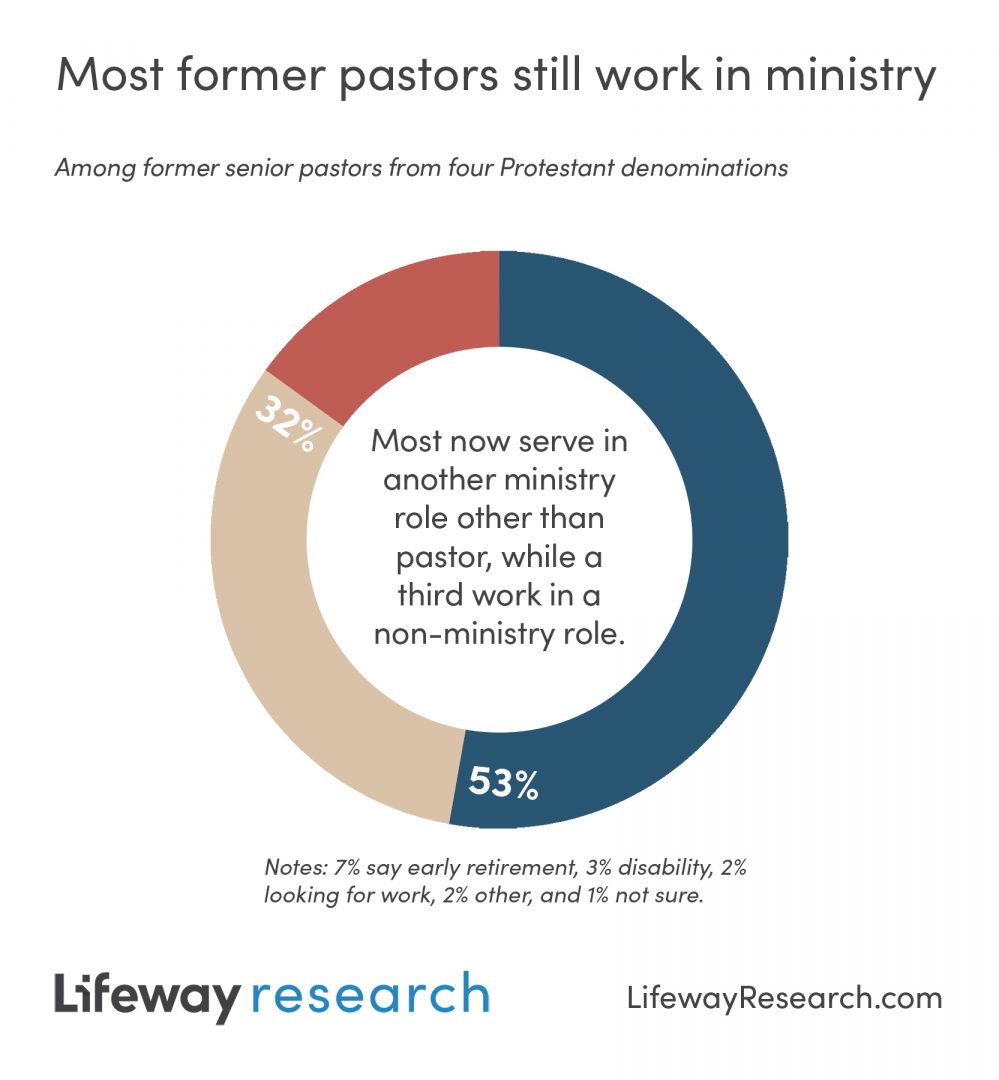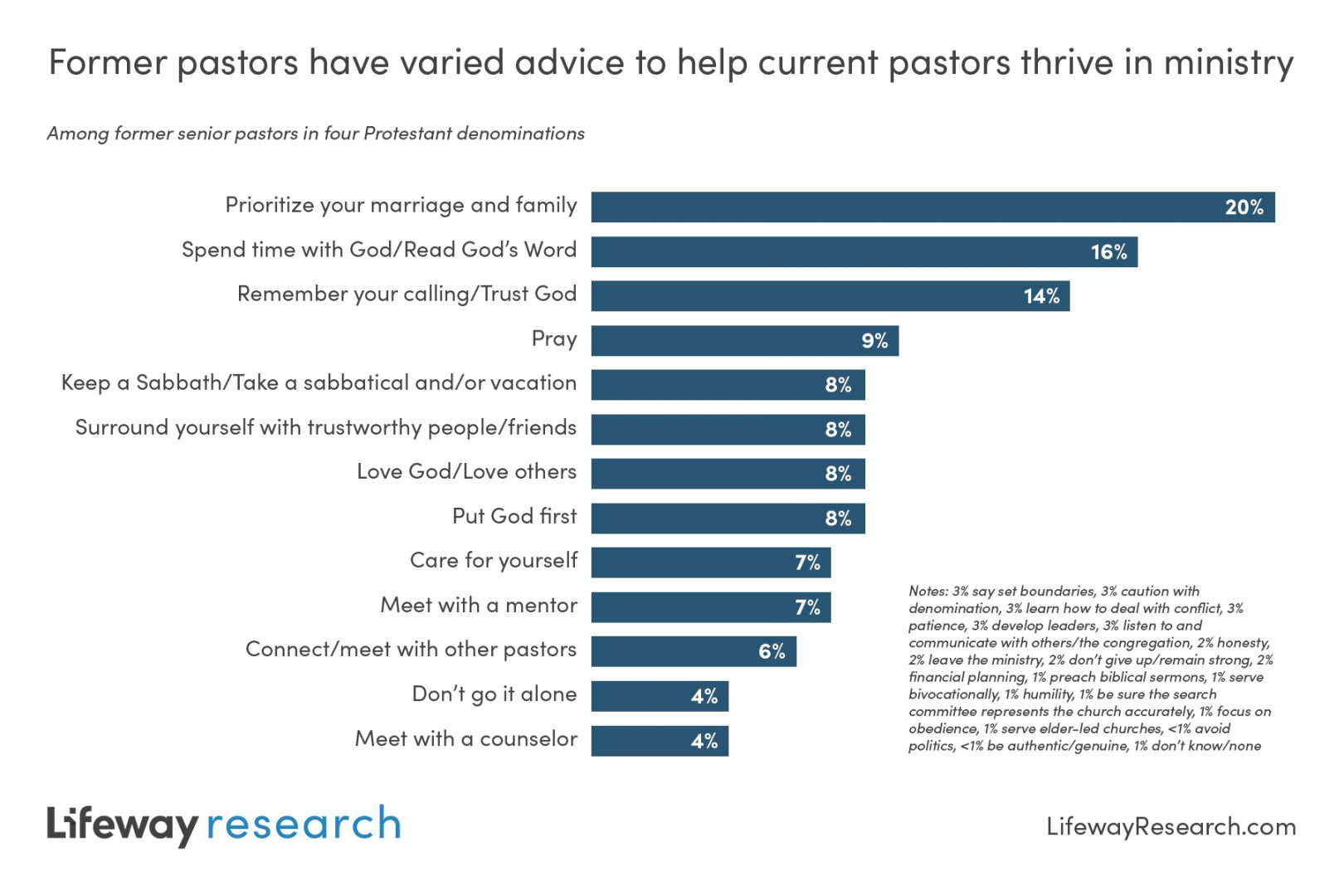
BRENTWOOD, Tenn. — Few pastors leave the pulpit each year, but those who do mostly say it was a personal decision.
According to a Lifeway Research study of former senior pastors in four Protestant denominations who stepped down before retirement age, 4 in 5 (81%) felt sure during most of their ministry at their last church that they could stay there as long as they wanted.
Only around 1% of U.S. Protestant pastors leave the ministry each year, according to the most recent Lifeway Research study. Among pastors from four denominations who step down, 2 in 5 (40%) say it was related to a change in their calling.
Other leading causes are conflict in a church (18%), burnout (16%), family issues (10%) and personal finances (10%). Some point to an illness (6%), being a poor fit with a church (6%), not being able to find a church that was a good fit (4%), denominational issues (4%), or the church closing or issues related to the pandemic (3%). Only 1% blame a lack of preparation for the job. While pastors stepping down for a moral or ethical issue garner the most headlines, only 3% are connected to that cause. Some say another reason (6%) or none of these (3%).

“Because social media tends to spread current stories that are far from normative, we run the risk of becoming convinced of falsehoods about pastors today,” said Scott McConnell, executive director of Lifeway Research. “This research study provides uncommon access to a reliable sample from four denominations of those who left the pastorate early, and the most frequent reason for stepping away from the senior pastor role is God’s leadership to do so.”
Who are former pastors?
While some pastors left the pulpit only a few years short of retirement, others had only just begun life in the ministry when they quit. A third (33%) left when they were between the ages of 55 and 66, but similar percentages left when they were 45-54 (35%) and 44 or younger (32%).
More than 2 in 5 (43%) never made it to a second church, leaving pastoral ministry entirely after their first. The same percentage (43%) served as a senior pastor for 10 years or less, including 21% who served five years or less. Around a third (32%) were a senior pastor between 11 and 20 years, while a quarter (25%) stood behind the pulpit for more than 20 years.
For 3 in 4 former pastors, their last stop, whether it was their first or not, didn’t last long. Almost three-quarters (73%) served as a pastor at their last church for 10 years or less, including 45% who were there for five years or less. One in 5 (20%) were at their last church between 11 and 20 years before leaving the ministry. Just 7% say their last tenure lasted 20 or more years.
Despite stepping away from the pulpit, half (53%) of former pastors are still working in the ministry, just in a role other than pastor. A third (32%) work in a nonministry role. Few took early retirement (7%), disability (3%), are currently looking for work (2%) or have some other employment situation (2%).

“It’s not surprising to see the majority of former pastors still working in ministry,” McConnell said. “In addition to many feeling called to their new role, the majority of current Protestant pastors say they have limited nonministry work experience, with 6 in 10 having worked outside of ministry for 10 years or less before becoming a pastor.”
Church conflict
Conflict, the second-leading reason pastors become former pastors, is a reality in many congregations, but for some leaders, it becomes too much.
Almost half (45%) of former pastors say they experienced significant conflict in their church during the last year they served as pastor. Additionally, 9 in 10 (87%) faced conflict at some point in their last congregation, most commonly over changes they had proposed (56%). Half of former pastors had conflict with lay leaders (50%) or experienced a significant personal attack (49%).
Around 2 in 5 saw conflict over expectations about the pastor’s role (40%) or their leadership style (38%). Close to a quarter experienced conflict related to national or local politics (27%) or doctrinal differences (22%). One in 8 (12%) say none of these.
“The experiences of those who left the pastorate early include more conflict than the typical current pastor has,” McConnell said. “Among evangelical and Black Protestant current pastors, only 19% experienced significant conflict this last year, while 45% of former pastors from these four denominations had significant conflict their last year as pastor.”
It’s not as though former pastors were blindsided by the existence of conflict. Nine in 10 (92%) say they expected there would be a need to confront conflict in their church. Almost as many (86%) say they consistently listened to people in their church for signs of conflict. Similarly, 84% invested in processes and behaviors to prevent conflict. Additionally, most (55%) say their training prepared them to handle the people side of ministry.
Family issues
One in 10 former pastors (10%) say family issues contributed to their leaving the pulpit, but most tried to prioritize family life.
More than 2 in 3 (68%) say they consistently put their family first when time conflicts arose. Still, 50% believe the demands of ministry kept them from spending time with their families, and 41% believe their families resented the demands of pastoral ministry. Additionally, 3 in 4 (73%) were often concerned about the financial security of their families.
Ministry wasn’t all negative for the pastor’s family. Two in 3 (65%) former pastors say their last congregation regularly provided their families with genuine encouragement. Four in 5 (80%) were able to take a vacation with their families for at least a week away from their church work.
Former pastors believe their spouses were on board with church life. More than 4 in 5 (83%) say their spouses were very satisfied with their marriages. Almost 3 in 4 (72%) say their spouses were enthusiastic about their life in ministry together. Also, 59% planned a date night alone with their spouse at least once a month.
“While it can be true in any occupation that your personal wellbeing and family can impact your job, the role of pastor amplifies the importance of balance among these. Desiring to do more ministry is a noble compulsion, but not at the expense of health and family,” said McConnell.
Ministry problems
As former pastors reflected on their time in the ministry, they highlighted many areas of concern. Many felt pressure from the congregation. Most (53%) felt the church had unrealistic expectations of them. And around a third (35%) didn’t feel free to say no when expectations of them were unrealistic.
Four in 5 (80%) felt they had to be “on call” 24 hours a day. Most (53%) often felt the demands of ministry were greater than they could handle, while almost 2 in 3 (64%) frequently felt overwhelmed with the role of pastor. More than 2 in 5 (42%) don’t feel the search team or leaders accurately described their last church before they arrived.
As this pressure built on former pastors, more than 1 in 3 (37%) frequently became irritated with people at their church. More than 2 in 3 (68%) felt isolated as pastors.
“A church functions a lot like a team, and on a team, each player has a role to play. When the pastor’s role and responsibilities are not clear, it creates unfair strain,” said McConnell.
Still, most pastors were able to find time for themselves and with God during the week. More than 2 in 3 (68%) were able to unplug from ministry work at least once a week. Nearly 3 in 4 (73 %) had personal time with the Lord, outside of sermon or lesson preparation, five or more times a week.
Advice for current pastors and churches
Looking back on their time in the pulpit, former pastors have some suggestions for current pastors and their congregations.

When asked what advice they have for current pastors to help them thrive in ministry, former pastors are most likely to tell those still leading churches to prioritize marriage and family (20%), spend time with God and read His Word (16%) and remember their calling and trust God (14%).
Around 1 in 10 former pastors advise current pastors to pray (9%), take time away (8%), surround themselves with trustworthy people and friends (8%), love God and love others (8%), put God first (8%), care for themselves (7%) and meet with a mentor (7%).
Close to 1 in 20 say those still in the ministry should connect and meet with other pastors (6%), not go it alone (4%) and meet with a counselor (4%).
Fewer former pastors say to set boundaries (3%), have caution with the denomination (3%), learn how to deal with conflict (3%), have patience (3%), develop leaders (3%), listen to and communicate with the congregation (3%), be honest (2%), don’t give up and remain strong (2%), and work on financial planning (2%).
Even fewer former pastors advise current pastors to preach biblical sermons (1%), serve bivocationally (1%), display humility (1%), be sure the search committee represents a church accurately (1%), focus on obedience (1%), serve in elder-led congregations (1%), avoid politics (<1%) and be authentic or genuine (<1%). Only 1% didn’t offer any advice.
Even among former pastors, just 2% tell current pastors to leave the ministry.
“It is important to notice what former pastors do not give as advice: They do not encourage pastors to do more themselves,” McConnell said. “Trusting in God and taking time to care for their family and themselves make up most of the advice.”
When offering advice to churches on how they can best help their pastor thrive in ministry, former pastors give fewer options.
At least 1 in 10 say congregations should love and respect their pastor’s family (14%), pray for their pastor (14%), give them time off and protect it (12%), encourage and care for them (11%), be supportive (10%), and have clear and realistic expectations (10%).
Slightly fewer advise churches to respect and honor their pastor (9%), provide for them (8%), remember pastors are human (7%), serve or volunteer (7%) and love them (7%). Few say to invest in their pastor (4%), cooperate with them (3%) or move to be elder-led (<1%). Only 2% offered no advice to churches.
“Former pastors’ requests for how churches should treat their pastors are not lengthy. Most listed only one piece of advice, with many focusing on the personal elements of love, care, prayer, respect and encouragement,” said McConnell. “On the practical side, former pastors encourage churches to have realistic expectations of their pastors, with more mentioning appropriate time off than financial provision.”
For more information, view the complete report and visit LifewayResearch.com.
Methodology
The study was sponsored by Houston’s First Baptist Church and Richard Dockins, M.D. The online survey of former senior pastors was conducted May 6-July 6, 2025. The sample lists were created and invitations sent by four Protestant denominations: Assemblies of God, Church of the Nazarene, The Wesleyan Church and Southern Baptist Convention. Each survey was completed by an individual who has served as a senior (or sole) pastor but stopped serving as senior pastor prior to age 67. The completed sample is 730 former pastors.
(EDITOR’S NOTE — Aaron Earls is a writer for LifeWay Christian Resources.)


